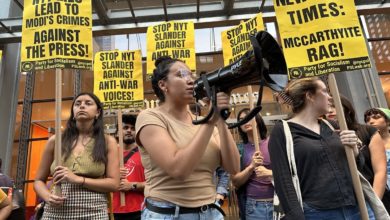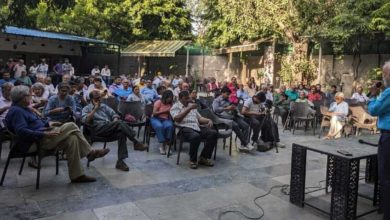In the last few years, India has been held up as a glowing example of globalization’s “benefits,” including so-called free trade and the exploitation of natural resources by foreign corporations. Earlier this year, the country received a small nod for its compliance; it was on the cover of Newsweek magazine, which featured several articles praising India.
New York Times columnist Thomas Friedman has praised India with words that would make any profit-minded
|
Marauding capitalists cannot help but find that image appealing, but cracks have developed that threaten the facade. Among others, there is a growing movement opposing two American corporations: Coca-Cola and Pepsi.
India’s people are taking issue with extremely high pesticide levels in Coke and Pepsi products; bottling plants that deplete groundwater, severely impacting the local communities; and sheer corporate arrogance on a level that recalls the days of British colonial rule.
‘It’s the real thing’
A study released earlier this month by the Center for Science and Environment found pesticide levels in Coke and Pepsi products that were 24 times higher on average than European Union limits. Because of those findings, at least seven Indian states have initiated partial bans on sales of Coke and Pepsi products. The southern state of Kerala, led by the Communist Party, has imposed a total ban on sales and production of Coca-Cola and Pepsi products and shut down all related factories. The state of Karnataka is suing Coca-Cola in Indian courts.
Foreign capitalists have bristled at these actions. U.S. undersecretary for international trade Franklin Lavin warned, “In a time when India is working hard to attract and retain foreign investment, it would be unfortunate if the discussion were dominated by those who did not want to treat foreign companies fairly.”
India’s federal government has echoed the imperialists’ concern. The federal health minister Anbumani Ramadoss recently told parliament that CSE’s data was flawed. This despite the fact that the U.S. Food and Drug Administration has rejected shipments of Indian-bottled Coca-Cola products at least 10 times since January 2005, citing them as unsafe for American consumption.
In response to the Indian health minister’s comments, CSE’s director, Sunita Narain, accused Ramadoss of colluding with the cola companies and said he was “more concerned with industrial health [than] people’s health.”
Continuing battle against soda giants
The battle between Coca-Cola and Indian villagers and environmentalists has roots that precede the recent revelations. In 2003, CSE sampled Coca-Cola products in India and found that they contained high levels of DDT, malathion and other pesticides unsafe for human consumption.
Coke and Pepsi also have been extracting millions of liters of groundwater in drought-prone areas of India, leading to
 |
The Kerala state pollution control board issued a “stop order” notice to the company because of very high levels of heavy metals such as lead and cadmium around the plant. Coca Cola, as a “goodwill” gesture, then distributed the bottling plant’s waste products to farmers, saying they could use it as fertilizer. When a BBC reporter questioned Coke officials about the distribution of toxic waste as fertilizer, a company vice president defended the practice: “it’s good for the farmers, because most of them are poor.”
Protests grew against the large bottling plant in Plachimada, Kerala, and it was shut down in March 2004 in one of the most significant community-led victories over a large multinational corporation in recent times.
In the northern Indian state of Rajasthan, more than a thousand people recently demonstrated to demand the shutdown of Coca-Cola and Pepsi bottling plants. Protesters accused the Coke bottling plant of creating severe water shortages affecting more than 50 surrounding villages.
Actions against Coke and Pepsi are spreading and growing. The Research Foundation for Science, Technology, and Ecology, based in New Delhi, has announced that it will organize a blockade of trucks for five days in November. The blockade will be part of a “Quit India” campaign against Coca-Cola and Pepsi.






